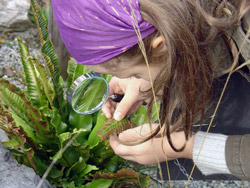Hands-on learning turns children’s minds on to science
Thousands of schoolchildren will soon be asking the questions when inquiry-based learning comes to science classrooms across Europe, turning the traditional model of science teaching on its head. The pan-European INQUIRE programme is an exciting new teacher-training initiative delivered by a seventeen-strong consortium of botanic gardens, natural history museums, universities and NGOs.
Coordinated by Innsbruck University Botanic Garden, with support from London-based Botanic Gardens Conservation International (BGCI), INQUIRE is a practical, one-year, continual professional development (CPD) course targeted at qualified teachers working in eleven European countries. Its focus on inquiry-based science education (IBSE) reflects a consensus in the science education community that IBSE methods are more effective than current teaching practices.
Designed to reflect how students actually learn, IBSE also engages them in the process of scientific inquiry. Increasingly it is seen as key to developing their scientific literacy, enhancing their understanding of scientific concepts and heightening their appreciation of how science works. Whereas traditional teaching methods have failed to engage many students, especially in developed countries, IBSE offers outstanding opportunities for effective and enjoyable teaching and learning. It provides stimulating environments for students to explore their learning in authentic situations. Knowledge is built through testing ideas, discussion with teachers and peers, and direct interaction with scientific phenomena. In fostering a practical, hands-on approach, IBSE can lead to a ‘minds-on’ comprehension of scientific concepts.
INQUIRE’s partner institutions will offer IBSE training and support to teachers and educators and help them become reflective practitioners. The participation of two of Europe’s leading science education research institutions – King’s College, London and the University of Bremen BRD – is also critical, providing an analytical framework and standards benchmark for the programme.
Biodiversity loss and global climate change, among the major scientific as well as political challenges of our age, are core INQUIRE concerns. It is envisaged that, with IBSE training, teachers will be encouraged to find engaging, innovative and practical approaches to these subjects through both formal and informal (Learning Outside the Classroom) education systems.
INQUIRE will be delivered by its partners through the teaching CPD structures of their respective countries, as well as using informal training networks. In Tirol the Pädagogische Hochschule (PHT) is the strong partner to facilitate this process. An interactive website is being designed to promote IBSE and encourage dialogue between partners and teachers. It will also showcase best practice published on other EU websites and highlight the results of practitioner research.
Welcoming the INQUIRE programme, BGCI’s Director of Education, Julia Willison said: “This is an outstanding opportunity to make science learning exciting and relevant to children in classrooms across Europe, especially if it can do something to arrest the worrying decline in students choosing to study science or embark on scientific careers – just when we need them most!”
| Bild/Dokument | Beschreibung | Format |
Copyright |
 |
Inquiry-based learning has already been in use in Innsbruck for years in the Botanical Gardens' Plant Science Education Center. |
University of Innsbruck |
Rückfragehinweis:
Dr. Suzanne Kapelari
Institute of Botany
University of Innsbruck
Tel.: +43 512 507-5943
E-Mail: suzanne.kapelari@uibk.ac.at
Mag. Stefan Hohenwarter
Public Relations Office
University of Innsbruck
Tel.: +43 512 507-32003
E-Mail: stefan.hohenwarter@uibk.ac.at